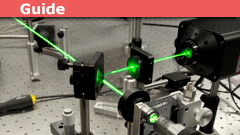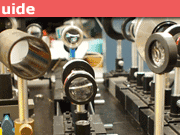Choosing a Research Area and an Advisor As a Physics Major
Full Chapter List - So You Want To Be A Physicist... Series
Part I: Early Physics Education in High schools
Part II: Surviving the First Year of College
Part III: Mathematical Preparations
Part IV: The Life of a Physics Major
Part V: Applying for Graduate School
Part VI: What to Expect from Graduate School Before You Get There
Part VII: The US Graduate School System
Part VIII: Alternative Careers for a Physics Grad
Part VIIIa: Entering Physics Graduate School From Another Major
Part IX: First years of Graduate School from Being a TA to the Graduate Exams
Part X: Choosing a Research area and an advisor
Part XI: Initiating Research Work
Part XII: Research work and The Lab Book
Part XIII: Publishing in a Physics Journal
Part XIV: Oral Presentations
Part XIII: Publishing in a Physics Journal (Addendum)
Part XIV: Oral Presentations – Addendum
Part XV – Writing Your Doctoral Thesis/Desertation
Part XVI – Your Thesis Defense
Part XVII – Getting a Job!
Part XVIII – Postdoctoral Position
Part XIX – Your Curriculum Vitae
In the previous part, I described the trials and tribulations of going through the qualifying exam that almost all graduate physics students have to go through. In this part, we will assume that you got through that very difficult part of your graduate program and now ready to do some serious, real physics work – choosing a research area and an advisor.
I neglected to mention last time that when you first enter the graduate program, very often, you are assigned a faculty member at random to advise you on what you need to do the first year or two before you actually choose an area of specialization. This is because most physics students will be taking roughly similar classes that are part of the required set. Your initial advisor can be helpful in determining if you need to do a refresher course in advanced undergraduate classes to prepare you for the qualifier. In any case, there’s a good chance that you will not maintain the same advisor once you decided to specialize in a particular field of physics.
So now what happens after you pass through your qualifier? If you’re lucky (or stubborn), you would have an idea of an area of physics to go into. In many large schools, there usually is more than one faculty member working in that area. If not, then do what I did – shop around. Start with the department’s graduate program description. Figure out who is doing what. Then ask other graduate students, especially the senior ones, what so-and-so is doing, if he/she has research grant money, etc. I will give you my criteria for choosing an advisor:
1. And obvious one, is he/she knowledgeable or a well-known expert in that field. This is a given, but you’d be surprised how there are faculty members who are clueless about the latest development in a field of study. This is especially true if he/she doesn’t have research fundings and thus, does not often travel to attend conferences, etc.
2. Is that person available for easy contact? This may be surprising but consider the fact that many research projects require one’s presence elsewhere, even out of the country. There is no point in choosing someone well-known, and have that person not available often for you to talk to. Worse still, sometimes you are assigned to a post-doc to supervise your work. This may or may not be a bad thing, but you should at least be aware that this is what is going to happen before you go into it.
3. But most importantly (at least in my book), can you get along with this person. I have seen way too many sad situations where the mentor and the student are simply either miscommunicating with each other, do not understand each other, or simply cannot get along. This will make for a hellish experience and I have never seen anything good coming out of such a thing.
Choosing an advisor is the next most important task you have to do after your qualifier. This is the person who might determine your future, and certainly your professional future. An excellent advisor will not only advise you on the official requirements that you must complete for graduation but also train you to become a good physicist. Such training is not covered in the school’s bulletin or official requirements. Yet, these are the stuff that could be more important for your future as a physicist. Your advisor needs to tell you the state of the knowledge in that field of study so that the two of you can decide on a particular work that you can do that will become your research dissertation. He/she needs to make sure you start to establish your reputation by making sure you get to publish a few papers in respected physics journals. And as important, he/she will make you attend and present your work at various physics conferences so that you acquire the ability to speak in front of your peers and experts in the field. This will also serve to give you visibility to others in the same field, gives you the opportunity to know who’s who in your field, and make contacts. Never, ever underestimate the benefits of professional contacts – you will come to value those if you continue in physics.
So if your advisor cares for your development as a physicist, he/she will take steps to ensure that you will have such an experience.
There is one thing that I should also mention: pedigree. Having a very well-known physicist as an advisor often can play a big role in one’s future. For example, as far as I can remember, practically all of Phil Anderson’s graduate students at Princeton went on to hold prestigious faculty positions at prominent schools. The same can be said with a number of other famous physicists. Of course, these people get to choose the cream-of-the-crop candidates in the first place, so that already ensures that these students are some of the best minds there are. It is why many students clamor for a well-known physicist, because in the ensuing competition for post-doc and employment, who your advisor was can be the tie-breaker. My personal observation on this is that this is more prevalent in theoretical physics than in experimental physics. This is because even someone from a small, less well-known school can make a big impact in experimental work, especially if there’s access to either a large facility or a Nat’l Lab. This occurs less often in theoretical physics, and usually, well-funded theoretical programs are often found centered around well-known theorists.
In the next installment, we’ll go over the daily grind of doing graduate research work.
PhD Physics
Accelerator physics, photocathodes, field-enhancement. tunneling spectroscopy, superconductivity








Thanks for the post! This is an automated courtesy bump. Sorry you aren’t generating responses at the moment. Do you have any further information, come to any new conclusions or is it possible to reword the post?